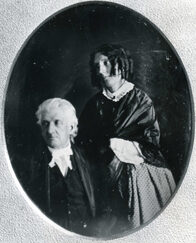|
Stay tuned for additional posts answering questions posed by the participants of the Harriet Beecher Stowe House Community Connection Facebook group. CLICK HERE to join the group and submit your own questions to our volunteer team! Today's question is answered by docent Nicholas Andreadis.  Harriet Beecher Stowe and her father Lyman Beecher (photo from Harriet Beecher Stowe Center) Harriet Beecher Stowe and her father Lyman Beecher (photo from Harriet Beecher Stowe Center) Question: How did Harriet and her father get along since they seem to be on opposite sides on how to accomplish abolition? In the nineteenth century no issue was more divisive within American families than slavery; what should be done about the institution and more specifically who should fight for it or against it. Side-stepped by the framers of the Constitution, it fell to American families to resolve the great questions. This was certainly a topic in the hearts and minds of the Beecher family; no more so than Harriet and her father, Lyman. It was natural that Harriet would first look to her father (along with her sister Catharine and her Aunt Harriet) for guidance and perspective. Like many important men of the 1820s, Lyman Beecher supported the American Colonization Society’s program of helping free Blacks emigrate to West Africa. Colonization proved over time to be an ineffectual method for calming the turbulent waters of slavery. Milton Rugoff tells us that William Lloyd Garrison, editor of the anti-slavery newspaper The Liberator, became a member of Beecher’s congregation in Boston. Garrison, he writes, was soon urging Beecher toward the abolitionist stance. But Beecher was not moved easily and like many ministers of the time he argued that even the Bible had at times vacillated on the issue of slavery. He allowed that slavery was evil but appealed to God’s righteousness to destroy the institution. One might conclude that Lyman “walked the fence” between what was morally right and what was pragmatic. His stances during the Lane Debates provide further evidence for this. He oscillated between support for the students and submission to the wishes of the school’s trustees. Harriet by nature and disposition was a quiet, introspective thinker and she brought these characteristics to her evolving attitude regarding slavery. She developed her own philosophical, moral and spiritual touchstones ultimately becoming a fierce abolitionist.
Harriet recalls from her childhood overhearing discussion among her elders over the great debate of that time, the Missouri Compromise. Only later would she realize that no compromise would settle the greatest issue facing America in the Nineteenth century. She was a witness to the famous Lane Debates organized in 1834 by the firebrand, Theodore Weld. And certainly, she was influenced by her brother Edward’s Narrative of Riots at Alton (Illinois) describing the brutal killing of abolitionist minister and editor Reverend Elijah Lovejoy. She was later Influenced by Angelina Grimke and began to view abolition and women’s rights as linked issues. It was the death of her son Charley to cholera in 1849 and the passage of the 1850 Fugitive Slave Act that drove her to write Uncle Tom’s Cabin. Harriet carefully listened to the arguments within her community and the experiences of free and fugitive slaves choosing the written word to express her contempt for slavery, often doing so anonymously to avoid drawing unpleasant attention to her father. Though later she veered away from her father on the issue of abolition and abandoned the strict principles of Calvinism, I found no evidence that she held any antipathy toward him. Rugoff offers that in her autobiography Harriet paid tribute to her father in his prime. She was to my mind and by most accounts a loyal daughter. Source material for this essay: The Beechers: An American Family in the Nineteenth Century by Milton Rugoff (1981) Harper and Rowe Harriet Beecher Stowe: A Life by Joan Hedrick (1994) Oxford University press About the author: Dr. Nicholas Andreadis is a docent at the Harriet Beecher Stowe House. He was a professor and dean at Western Michigan University prior to moving to Cincinnati.
0 Comments
Leave a Reply. |
Archives
March 2025
Categories
All
|
|

 RSS Feed
RSS Feed